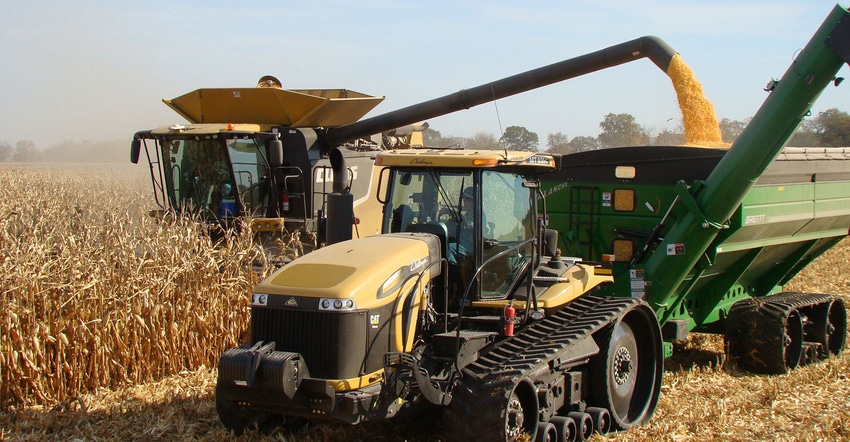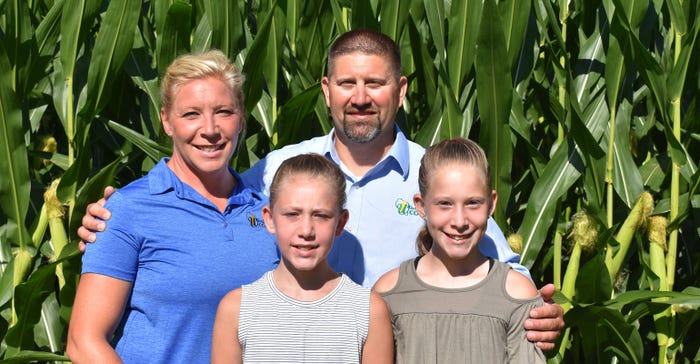October 15, 2021

Call Casey Kelleher a corn activist. He was on the board and is a former president of the Wisconsin Corn Growers Association, and chairs its political action committee. He is vice president of the Wisconsin Corn Foundation and recently was appointed to the U.S. Grains Council Asia Advisory Team.
Both farmer and farm manager, he raises corn and soybeans on 3,500 acres of his own and the farm he manages in the Whitewater, Wis., area.
Speaking up
Kelleher says he’s opinionated “to an extent.” Not outspoken, “but I will speak up.”
He’s an ethanol backer, calling it “good and clean — we have to keep fighting for it.” All his crop used to go into ethanol. Last year, most went to the Illinois River markets, where his soybean production goes as well.
Kelleher raises two-thirds corn and one-third soybeans on the 3,500 acres, following conventional tillage practices on a broad range of soil types, from light and sandy to peat and heavier black earth. He rotates back and forth, following corn with corn depending on the area.
“Some we rotate every year; on others, we plant several years of corn,” Kelleher says.
He’s the farm manager for Reeb Farms Inc., working with three full-time and two or three part-time employees, depending on the season.
Kelleher is depending more on the employees following a recent farm accident. He says he was loading a tractor to pull a homecoming float in Milton, Wis., where his wife, Ashley, is an elementary school teacher. The tractor rolled back down the ramp and over him.
“I got really bruised up, a bunch of staples in my head, and I broke three bones at my ankle,” he explains. Kelleher endured a trip to a Janesville hospital and then Flight for Life to University Hospital in Madison.
While recovering, he says, “I feel extremely blessed to have gotten through this with only the bruises and broken ankle bones. The outreach of everyone has been unbelievable. My strong wife and two daughters are doing a great job helping me recover.”

He says he lucked out with the family he works for. “They are definitely second parents. I consider them second parents, employers and best friends,” he says. Kelleher also works his own acreage — a farm he bought from his grandparents 10 years ago after farming alongside the much larger Reeb Farms. He points out with pride that next year, his farm will be in the family 180 years, since June 1842. “I’ve got all the land grant documents,” he adds.
Come forward about 159 years; that’s when Kelleher graduated from the University of Wisconsin-Platteville with a bachelor’s degree in ag business, and soil and crop science.
“It was a great foundation, and I’m always adding to it,” he says. “The networking [of college friends and instructors] is as important as the foundation.”
Both serve him well as a farmer, farm manager and seed representative for Wyffels Hybrids of Whitewater. Kelleher soil samples every four years, fertilizes in response and forward-contracts 25% of the crop.
“As the crop matures, I do a little more, or if there is a bump in the market, I’ll do a little more,” he notes. He calls forward contracting a good starting point and believes firmly in crop insurance.
He thought the corn crop was “looking OK — better than the beans” as the crops matured. He discloses that the farms made money last year, adding, “We’ll see what happens in 2021-22.”
Finding a voice
Like all farmers, Kelleher doesn’t like Mother Nature much at times “and probably some of the politics, but that’s the reason I got involved with the Corn Growers. At least I have a voice. … There always are ways to improve,” he says of the organizations, “but I think it’s effective.” In meetings with Wisconsin’s congressional representatives and state legislators, he’s found them “pretty receptive. … We educate them on certain things.”
Kelleher and his wife and daughters, Kya, 13, and Natalie, 11, manage to find fun time even with his heavy workload. They enjoy ATV and snowmobile treks. Winter days when the rest of the family is at school, he’ll be in the extensive farm shop doing “pretty much everything” with machine maintenance and repair, unless it’s electrical.
“Every day is a new day. There’s always something to do,” he says. “Yeah, it keeps me busy. It’s nice working for a family-owned company, that’s for sure.”
For a while, though, it’s not work — just rest and recovery, and maybe some corn activism for Casey Kelleher.
Buchholz lives in Fond du Lac, Wis.
About the Author(s)
You May Also Like




